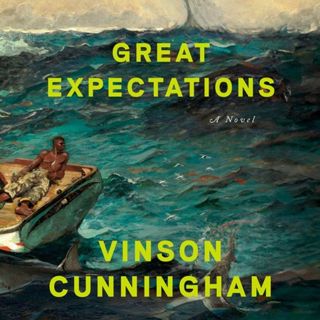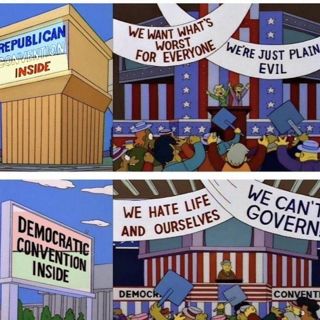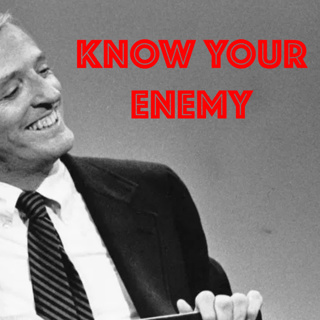![Kamala's Commanding Debate Performance [TEASER]](https://cdn.podme.com/podcast-images/A46412B1DCA519446812E51C9F7393B6_small.jpg)
Kamala's Commanding Debate Performance [TEASER]
Listen to the rest of this premium episode by subscribing at patreon.com/knowyourenemyYour intrepid hosts watched the first, and possibly only, presidential debate between Kamala Harris and Donald Trump so you didn't have to—and then stayed up late to talk about it. After a somewhat wobbly start, Harris seized the momentum with a visceral, deeply affecting answer about the consequences of the GOP's assault on abortion rights, then baited Trump into a rambling rant about the size of his crowds. He never really recovered, and spent much of the rest of the debate running his mouth about the debunked story of Haitian immigrants stealing and eat pets in Ohio or claiming that Harris was responsible for every policy of the Biden administration. What did we learn about the candidates and their priorities? Did Harris break with Biden in any significant ways? What does the Trump-Vance obsession with immigrants reveal about their campaign? What firearm does Harris own? And what about foreign policy? Make sure you listen to the very end!Sources:Sam Roberts, "Noel Parmentel Jr., Essayist, Polemicist and Apostate, Dies at 98," New York Times, Sept 6, 2024Watch the entire Harris-Trump debate (YouTube)Nate Cohn, "New Poll Suggests Harris’s Support Has Stalled After a Euphoric August," New York Times, Sept 8, 2024 Huo Jingnan and Jasmine Garsd, "JD Vance Spreads Debunked Claims about Haitian Immigrants Eating Pets," NPR, Sept 10, 2024Mike Catalini, et al, "Trump Falsely Accuses Immigrants in Ohio of Abducting and Eating Pets," Associated Press, Sept 11, 2024B.D. McClay, "The Taylor Swift Endorsement Fantasy," New York Times, Sept. 8, 2024"Taylor Swift Derangement Syndrome," Know Your Enemy, Mar 26, 2024
12 Syys 20243min
![[UNLOCKED] The Uncommitted Movement (w/ Waleed Shahid & Abbas Alawieh)](https://cdn.podme.com/podcast-images/D134B116618DD5ECEC3DF81695448B7C_small.jpg)
[UNLOCKED] The Uncommitted Movement (w/ Waleed Shahid & Abbas Alawieh)
Matt and Sam interview Waleed Shahid and Abbas Alawieh, two organizers of the Uncommitted Movement, about their experiences in the months following October 7 as well as before, during, and after the Democratic National Convention. As an Arab-American from Michigan and one of the state's two Uncommitted delegates to the DNC, what has Abbas heard from the people in his community, and what has he heard from his party? Why try to work within the Democratic Party to change its approach to Israel-Palestine? What were the Uncommitted Movement's "asks" at the convention, and why were they all refused? How does the Democratic Party, institutionally, need to change to better reflect the broadly pro-ceasefire views of its voters? And is there any hope that a possible Harris administration will be an improvement on the dreadful status quo?Sources:Waleed Shahid, “Why the Uncommitted Movement Was a Success at the DNC,” Jacobin, Aug 27, 2024"'The Uncommitted Movement Is the Floor of What’s Possible:' An Interview with Waleed Shahid," Dissent, Aug 16, 2024Ben Terris, "A 'Ceasefire Delegate' Finds Lots to Do but Little to Celebrate," Washington Post, Aug 21, 2024Akbar Shahid Ahmed, "Gaza War Critics Are Inspired By The 1964 DNC — And They're Playing The Long Game," HuffPost, Aug 23, 2024Noah Lanard, "Why Were Democrats Afraid to Hear a Palestinian?" Mother Jones, Aug 31, 2024— "Here Is the Speech That the Uncommitted Movement Wants to Give at the DNC," Mother Jones, Aug 23, 2024Ta-Nehisi Coates, "A Palestinian American’s Place Under the Democrats’ Big Tent?" Vanity Fair, Aug 21, 2024
9 Syys 202459min
![The Uncommitted Movement (w/ Waleed Shahid & Abbas Alawieh) [Teaser]](https://cdn.podme.com/podcast-images/1FC0287892BB12F85CA4A5265904060F_small.jpg)
The Uncommitted Movement (w/ Waleed Shahid & Abbas Alawieh) [Teaser]
Listen to the rest of this premium episode by subscribing at patreon.com/knowyourenemyMatt and Sam interview Waleed Shahid and Abbas Alawieh, two organizers of the Uncommitted Movement, about their experiences in the months following October 7 as well as before, during, and after the Democratic National Convention. As an Arab-American from Michigan and one of the state's two Uncommitted delegates to the DNC, what has Abbas heard from the people in his community, and what has he heard from his party? Why try to work within the Democratic Party to change its approach to Israel-Palestine? What were the Uncommitted Movement's "asks" at the convention, and why were they all refused? How does the Democratic Party, institutionally, need to change to better reflect the broadly pro-ceasefire views of its voters? And is there any hope that a possible Harris administration will be an improvement on the dreadful status quo?Sources:Waleed Shahid, “Why the Uncommitted Movement Was a Success at the DNC,” Jacobin, Aug 27, 2024"'The Uncommitted Movement Is the Floor of What’s Possible:' An Interview with Waleed Shahid," Dissent, Aug 16, 2024Ben Terris, "A 'Ceasefire Delegate' Finds Lots to Do but Little to Celebrate," Washington Post, Aug 21, 2024Akbar Shahid Ahmed, "Gaza War Critics Are Inspired By The 1964 DNC — And They're Playing The Long Game," HuffPost, Aug 23, 2024Noah Lanard, "Why Were Democrats Afraid to Hear a Palestinian?" Mother Jones, Aug 31, 2024— "Here Is the Speech That the Uncommitted Movement Wants to Give at the DNC," Mother Jones, Aug 23, 2024Ta-Nehisi Coates, "A Palestinian American’s Place Under the Democrats’ Big Tent?" Vanity Fair, Aug 21, 2024
6 Syys 20242min

Political Fictions (w/ Vinson Cunningham)
Today, we're joined by one of our favorite writers and thinkers, Vinson Cunningham, to discuss his excellent debut novel, Great Expectations, which tells the story of brilliant-but-unmoored young black man, David Hammond, who finds himself recruited — by fluke, folly, or fate — onto a historic presidential campaign for a certain charismatic Illinois senator. A staff writer at the New Yorker, Vinson also worked for Obama's 2008 campaign in his early twenties. (He bears at least some resemblance to his protagonist.) And his novel provides a wonderful jumping-off point for a deep discussion of political theater, the novel of ideas, race, faith, the meaning of Barack Obama, and the meaning of Kamala Harris. Also discussed: Christopher Isherwood, Saul Bellow, Garry Wills, Ralph Ellison, Marilynne Robinson, Paul Pierce, and Kobe Bryant! If you can't get enough Vinson, check out his podcast with Naomi Fry and Alexandra Schwartz, Critics at Large. Sources:Vinson Cunningham, Great Expectations: A Novel (2024)— "The Kamala Show," The New Yorker, Aug 19, 2024— "Searching for the Star of the N.B.A. Finals," The New Yorker, June 21, 2024— "Many and One," Commonweal, Dec 14, 2020.Saul Bellow, Ravelstein (2001) Garry Wills, Lincoln at Gettysburg (1992)Ralph Ellison, Invisible Man (1952)— Shadow and Act (1964)David Haglund, "Leaving the Morman Church, After Reading a Poem," New Yorker Radio Hour, Mar 25, 2016. Phil Jackson, Sacred Hoops: Spiritual Lessons of a Hardwood Warrior (1995)Glenn Loury, Late Admissions: Confessions of a Black Conservative (2024)Matthew Sitman, "Saving Calvin from Clichés: An Interview with Marilynne Robinson," Commonweal, Oct 5, 2017...and don't forget to subscribe to Know Your Enemy on Patreon so you can listen to all of our premium episodes!
31 Elo 20241h 8min
![Kamala's Convention [Teaser]](https://cdn.podme.com/podcast-images/C71D661D538ECD754376354644F36B23_small.jpg)
Kamala's Convention [Teaser]
Four days in Chicago, dozens of speeches by Democratic luminaries and backbenchers, and a spotlight on Kamala Harris, who reintroduced herself to America — your favorite podcast co-hosts endured watching the Democratic National Convention and are here to report on what they saw.It was, in many ways, a highly successful convention: massive crowds, palpable energy for the Harris-Walz ticket, and orations met with pundits' plaudits. But the Democrats' refusal to feature a speaker from the Uncommitted delegates, and the general lack of evident concern for Palestinian suffering, was profoundly disappointing — and morally grotesque. As were the choices to feature cops and ex-CIA agents on the convention stage, and the broad affirmation, from Democrats, of the right's positions on crime and the border. What to make of it all? We discuss how Kamala tried to define her career and candidacy, what we make of Tim Walz (so far), how Democrats talked about Trump (including the shifts from how they've done so in the past), and the state of the presidential race now that both conventions are, blessedly, over.Sources:Watch Kamala Harris's full DNC speech (YouTube)Watch Tim Walz's full DNC speech (YouTube)Watch Michelle Obama's full DNC speech (YouTube)Liliana Segura, "Democrats Abandoned Their Anti-Death Penalty Stance. Those on Federal Death Row May Pay the Price," The Intercept, Aug 23, 2024.Josh Leifer and Waleed Shahid, "The Uncommitted Movement Is the Floor of What’s Possible,” Dissent, Aug 16, 2024Noah Lanard, "Here Is the Speech That the Uncommitted Movement Wants to Give at the DNC," Mother Jones, Aug 23, 2024
23 Elo 20246min

What Happened to America's Political Parties? (w/ Daniel Schlozman and Sam Rosenfeld)
Why are American political parties so ineffectual? Why do they seem, simultaneously, so frantically active and so incapable of achieving specific objectives? Why have the Democrats tended to seem listless, uncertain of their own ideological identity; while the Republicans are increasingly dominated by a radical, lunatic fringe more interested in becoming famous on television, radio, and social media than in governing? Why, in other words, are the political parties seemingly "everywhere and nowhere, overbearing and enfeebled, all at once?" In their new book, The Hollow Parties: The Many Pasts and Disordered Present of American Party Politics, political scientists Daniel Schlozman and Sam Rosenfeld set out to untangle this paradox. Theyargue that much of the discord, dysfunction, and democratic deficit which characterize contemporary politics can be attributed to the "hollowing out" of American political parties — a process which began, in earnest, in the 1970s, with the neoliberal dismantling of New Deal civil society, the rise of the New Right, and reforms to the party system in the wake of the 1968 conventions. In the wake of these changes, our parties have become unrooted from the communities where their constituents live; they are nationalized instead of locally oriented; they are swarmed by para-party groups and networks (the "party blob") which are both unaccountable and parasitic on the Party's aims; and they are lacking in legitimacy — mistrusted and often treated with contempt, even by their own members. What has this hollowness wrought in our politics? And can anything be done about it? Sam and Danny are here to explain. Here's a link for 25 percent off print subs to Dissent magazine through August 31: https://www.ezsubscription.com/dis/subscribe?key=DEKYESources:Daniel Schlozman and Sam Rosenfeld, The Hollow Parties: The Many Pasts and Disordered Present of American Party Politics (2024)Sam Rosenfeld, The Polarizers: Postwar Architects of Our Partisan Era (2017)Daniel Schlozman, When Movements Anchor Parties: Electoral Alignments in American History (2015)Please subscribe on Patreon to hear our bonus episodes!
16 Elo 20241h 11min

What's Wrong with J.D. Vance?
In this episode, your co-hosts take a harrowing journey into the life, mind, and times of J.D. Vance, the Republican senator from Ohio and current vice-presidential pick of Donald Trump. You probably were introduced to Vance as the author of Hillbilly Elegy, his 2016 memoir that attempts to explain the plight of the "white working class" in places like Kentucky and Ohio, and now know him as the deranged post-liberal purveyor of insults to single women, lies about Joe Biden targeting MAGA voters with fentanyl to thin their ranks, and deranged comments about the 2020 election and Jan. 6. In short, how did Vance become so weird—and menacing? We try to answer that question by starting with a close reading of Hillbilly Elegy, and then take listeners from the end of that book through the transformations that made Vance Trump's toadie-in-chief.Sources:J.D. Vance, Hillbilly Elegy: A Memoir of a Family and Culture in Crisis (2016)— "How I Joined the Resistance: On Mamaw and Becoming Catholic," The Lamp, April 1, 2020Glenn Kessler, "J.D. Vance’s Claim That Biden is Targeting ‘MAGA voters’ with Fentanyl," Washington Post, May 11, 2022Colby Itkowitz, Beth Reinhard and Clara Ence Morse, "In Vance, Trump Finds a Kindred Spirit on Election Denial and Jan. 6," Washington Post, July 17, 2024Ian Ward, "The Seven Thinkers and Groups That Have Shaped JD Vance’s Unusual Worldview," Politico, July 18, 2024Simon Van Zuylan-Wood, “The Radicalization of J.D. Vance,” Washington Post, Jan 4, 2022John Ganz, "The Meaning of JD Vance," Unpopular Front, Jul 16, 2024Dorothy Thompson, “Who Goes Nazi?” Harper’s, Aug 1941. Please subscribe on Patreon to hear our bonus episodes!
10 Elo 20241h 28min

Project 2025 Implodes (w/ Mary Harris)
An extra episode for you: Sam went on Slate's What Next podcast (hosted by Mary Harris) to discuss the rise and fall of the Heritage Foundation's Trump transition project — Project 2025. Is it dead? Why did Trump's campaign resent it so much? And how much influence would its architects have in a second Trump administration?We'll back to your regular programming (the J.D. Vance episode!) later in the week.
5 Elo 202423min






















